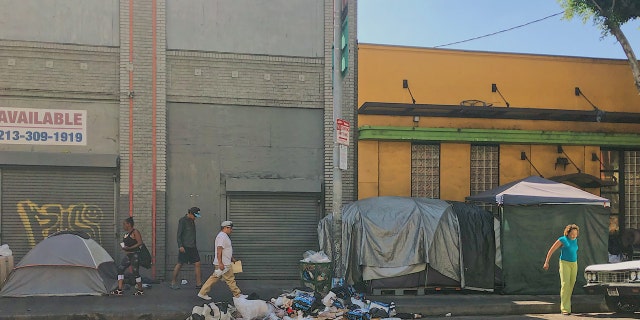The intersection of 6th St. and San Pedro St. in Los Angeles is the center of Skid Row. (Andrew O'Reilly/Fox News)
City officials, developers and restaurateurs in
Los Angeles
are touting the renaissance of the city’s once-blighted downtown thanks
to an explosion of trendy eateries, chic hotels and luxury apartments
that have attracted thousands of new – and generally financially
well-off – residents to the neighborhood in recent years.
But just
a few blocks south of the area where a set-course sushi meal costs
around $200 per person – wine or sake not included – is
perhaps the country's most notorious tent city and a neighborhood that has been labeled the epicenter of homelessness in America: Skid Row.
The
area -- which has been plagued by vagrancy, high crime rates and
unsanitary conditions almost since its development in the 1880s -- is an
unorganized collection of warehouses, wholesale storefronts
and decaying low-rent hotels. Its trash-strewn streets are lined with
the blue tarps and fraying tents of those residents unable to afford a
solid roof over their heads.
But as development in Downtown Los
Angeles steams forward unimpeded, city officials and developers are
eyeing Skid Row as possibly the next “up-and-coming” neighborhood – a
move causing tensions with advocates and community outreach workers who
wonder what this means for the thousands of homeless and itinerant
people who currently call the rundown area home.
Advocates and community outreach workers worry what housing
development will mean for the thousands of homeless and itinerant people
who currently call the rundown neighborhood home. (Andrew O'Reilly/Fox
News)
“Most
of Skid Row is already being carved up,” Jerry Jones, the director of
public policy at the Inner City Law Center in Los Angeles, told Fox
News. “We need to help those who live on Skid Row right now.”
The
population of Downtown Los Angeles, which encompasses Skid Row and a
number of other smaller neighborhoods, has seen its population skyrocket
from just 18,000 people two decades ago to currently 76,000. There are
also development plans bouncing around city hall that could bring
176,000 new residents to downtown by 2040.
Activists were enraged
last June by a city proposal to rezone an industrial section of Skid Row
to residential and open it up for market-rate development – a plan that
supporters said would continue to the growth of downtown and create
much-needed mixed office and living spaces in a city dealing with a
major housing shortage.
While the proposal did call for putting
social service agencies and permanent supportive housing in other parts
of Skid Row, advocates for the neighborhood worried that it would drive
up rents and displace some 4,000 people who currently live in the area’s
single-room occupancy hotels and other modest lodgings.
In a
concession to activists, a new rezoning plan released earlier this month
calls for the conversion of parts of Skid Row into housing for
residents earning between $10,000 and $58,000 annually. The plan also
calls for any new development in bordering neighborhoods like the Arts
District and Little Tokyo to include units for low-income residents.
Craig Weber, principal planner for the city of Los Angeles, told the Los Angeles Times that the new rezoning initiative is meant to create "housing opportunities for all."
“The
plan seeks to expand the opportunity for affordable housing through
policies, zoning and the community benefits program," he said.
Unlike
cities like New York and nearby Santa Monica, Los Angeles currently
does not have any laws on the books that require developers to mark off a
certain percentage of new units for affordable housing.
Skid Row
advocates like Jones say that the new rezoning plan is a start, but it
doesn’t address the area’s homeless crisis and will most likely still
displace the itinerant population of Skid Row into adjoining
neighborhoods like Boyle Heights and University Park.
“It’s a huge
opportunity that has been lost,” he said. “Any proposal to build in the
area should benefit the current residents of Skid Row first.”
Los
Angeles Mayor Eric Garcetti and other city lawmakers appear fully aware
that Skid Row has become the epicenter of a homeless crisis flaring
across major California cities – specifically prioritizing the
neighborhood in the mayor’s plan to tackle homelessness and allocating
$7 million from the $124 million the state recently approved for
improving the health and safety of city residents. This comes after the
city already spent $20 million last year to expand hygiene
infrastructure and street cleanups in the community.
Some 4,000 people currently live in Skid Row's single-room
occupancy hotels and other modest lodgings, with many more living in
tent encampments . (Andrew O'Reilly/Fox News)
“We
all know the epicenter of this crisis is Skid Row,” Garcetti said
during a press conference on Monday. “It’s where the extreme poverty
cuts the deepest, it’s where the racialized elements of this
homelessness crisis are most seen.”
He added: “The days of writing off this community are over.”
Besides
the hygiene initiative, the city also has plans to build a bin facility
for Skid Row residents to store their belongings, start a cleaning
initiative that would hire residents to clean the streets and construct
crisis beds for women in Skid Row at Downtown Women’s Center.
Activists
say that the city’s initiatives are a good start, but to really remedy
the dire situation that many on Skid Row find themselves in, a real roof
over their heads is the most important thing.
ICLC’s Jones
argues that different types of housing are needed to address the
complexities of the homeless crisis in Los Angeles – from permanent
supportive housing with on-site health professionals to deal with issues
like mental illness and drug addiction to transitional housing for
homeless youth and families trying to get back on their feet.
“Different people need different housing, but one thing they all need is a house,” he said.
The tent encampment on San Pedro St. in Skid Row borders a parking
lot that is slated to become a supportive housing complex with 298
residential units. (Andrew O'Reilly/Fox News)
Most housing development that has been constructed on
Skid Row over the last decade has been supportive housing, and a
nonprofit organization, the Weingart Center, recently proposed building a
19-story affordable housing tower in the neighborhood on what is
currently a parking lot.
The apartment complex would include 298
residential units – all studio apartments – as well as office space for
the Inner City Law Center and Chrysalis, a job training and placement
services nonprofit. The Weingart Center also has plans to build an
18-story and a 12-story supportive housing building on Skid Row that
would have 382 apartments for homeless individuals.
 Democratic presidential candidate, former U.S. Rep. Beto O'Rourke
speaks at the Manchester Democrats annual Potluck Picnic at Oak Park in
Manchester, N.H.
(AP)
Democratic presidential candidate, former U.S. Rep. Beto O'Rourke
speaks at the Manchester Democrats annual Potluck Picnic at Oak Park in
Manchester, N.H.
(AP)























